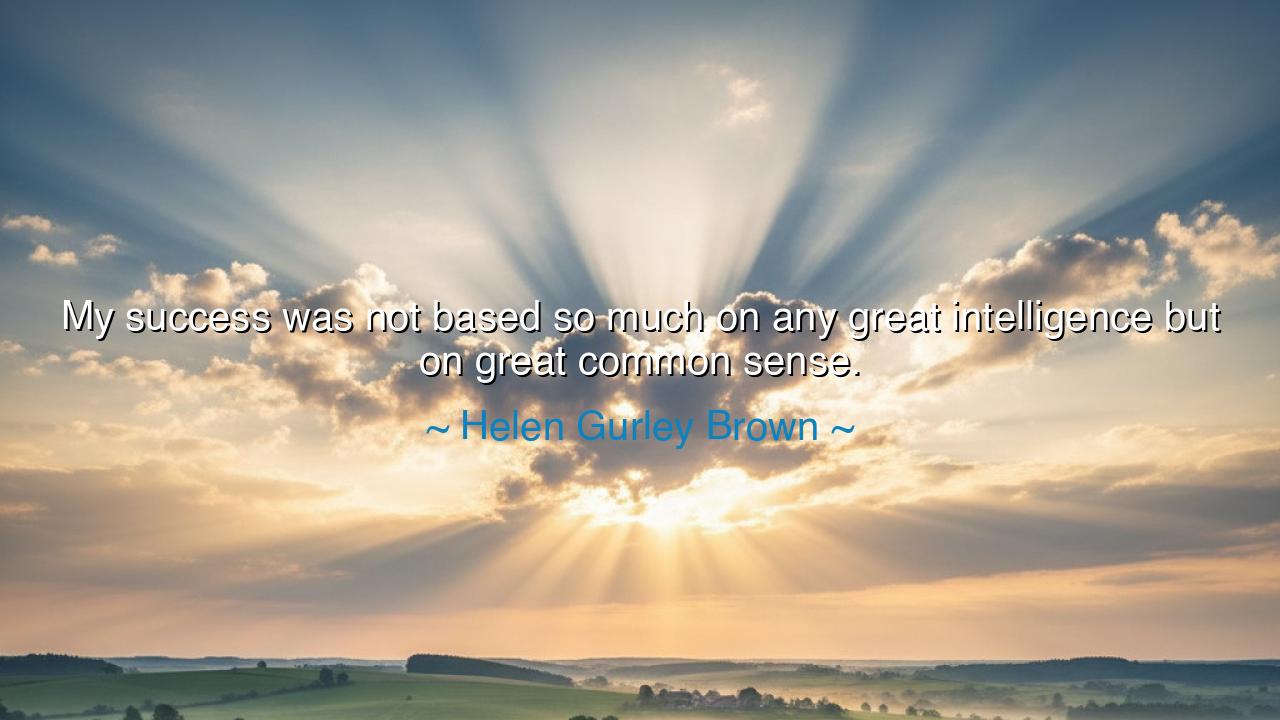
My success was not based so much on any great intelligence but on






In the annals of human achievement, amid the noise of intellect and ambition, Helen Gurley Brown spoke a truth as humble as it is profound: “My success was not based so much on any great intelligence but on great common sense.” These words, simple and unadorned, carry the weight of lived wisdom. For they remind us that brilliance, though dazzling, is often less powerful than clarity; and that true mastery of life depends not on the mind’s height, but on its grounding. Common sense — that quiet wisdom born of experience, intuition, and practicality — is the golden thread that weaves success from the ordinary fabric of existence.
Helen Gurley Brown, the pioneering editor of Cosmopolitan and author of Sex and the Single Girl, was a woman who rose not through privilege or pedigree, but through resilience and sharp perception of human nature. She lived in a world that underestimated her, yet she saw with piercing clarity what others missed: that understanding people — their hopes, fears, and desires — is the key to both influence and connection. Her success came not from lofty theories, but from the steadfast practice of seeing reality as it is and acting wisely within it. To her, common sense was not a dull trait, but a quiet form of genius — the art of choosing rightly when others are blinded by complexity or pride.
The ancients, too, praised this virtue. In the teachings of Confucius, the wise man is not the one who knows many things, but the one who acts rightly in all things. Aristotle called it phronesis — practical wisdom, the ability to discern the right action at the right time. For what use is a vast intellect if it cannot guide one’s steps through the living world? The farmer who knows when to sow and when to reap, the mother who soothes a child’s heart, the craftsman who perfects his trade — these, too, are philosophers of the everyday. Common sense is the wisdom of the real, the reason clothed in simplicity.
Consider the story of Abraham Lincoln, born in a log cabin, with little formal education and no inherited power. He was not known for academic brilliance, but for his clear-eyed reason and deep moral intuition. In times of division and despair, he guided a fractured nation with patience and insight, choosing words that healed rather than wounded. His greatness was not that of a scholar, but of a man who understood the human heart — who knew that wisdom, compassion, and balance matter more than intellectual display. Like Helen Gurley Brown, Lincoln proved that greatness is not always born of genius, but of grounded judgment.
In this light, Brown’s quote becomes a torch for all who feel ordinary or unexceptional. Too often, we are taught that success belongs only to the gifted — to the brilliant minds who dazzle the world with their intellect. Yet she reminds us that what truly sustains achievement is not the speed of thought, but the steadiness of it. Common sense is the compass of those who endure. It whispers what is right when cleverness tempts us astray; it teaches humility when pride would destroy us; it guides us to simplicity when the world is tangled in complexity.
But do not mistake common sense for mediocrity. It is the most refined form of intelligence — distilled through trial, error, and honest reflection. It demands awareness, courage, and the humility to learn from life itself. The wise are those who observe carefully, who listen deeply, who act thoughtfully. Helen Gurley Brown built her empire not by overthinking, but by understanding the rhythm of the world — how people dream, struggle, and desire. Her success was the triumph of intuition over abstraction, of wisdom in action over knowledge in theory.
So, my children, let this be your lesson: Seek not only brilliance, but clarity. Cultivate the mind that sees things plainly, that acts with reason, that honors simplicity. Use your intellect not to dazzle, but to serve; not to complicate, but to illuminate. When the path is unclear, trust the light of common sense — that quiet voice born from the union of heart and reason.
For in the end, the world does not reward those who know the most, but those who see the truest. As Helen Gurley Brown proved, the secret to greatness is not in the mind’s height, but in its wisdom of use. Be not the idle scholar, but the practical sage. Let your intelligence serve life, and your common sense will become the rarest form of brilliance — the kind that endures through every age.






AAdministratorAdministrator
Welcome, honored guests. Please leave a comment, we will respond soon